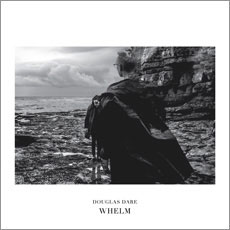From Chris Martin to Regina Spektor, tinkling on the ivories has become irrevocably linked with mushiness and sappiness, to the extent that plonking out a few chords, singing and calling it beautiful now seems odiously lazy. Luckily, Tom Odell has brought the farce of society’s immutably mushy love of the keyboard singer-songwriter to its nadir, so we can all breathe a sigh of relief, move on, and begin to rebuild – and Erased Tapes’ latest signing is perhaps the first of a new generation. The defining feature of Douglas Dare’s music is this very understanding that beauty is erratic; that discord, dissonance and unease are as communicative as the traditional romance and comfortable opulence surrounding the piano, and indeed the idea of the singer-songwriter at large.
Originally from Bridport in Dorset, the London-based Douglas Dare is often highlighted as a wunderkind for singing and songwriting at 23, as if age is somehow linked to ability. Ignoring this fallacy, the songs on Dare’s debut album, Whelm ache with a sort of moody emotion that young and old can have in common – wide-eyed, reflective and besotted with the way the world makes us feel. The record’s ten tracks often amount to little more than impassioned four minute musical meditations over which Dare yarns uniformly solemn poetry. Album closer ‘London’s Rose’ paints a harrowing picture of uncertainty in the Underground as the narrator takes shelter during the Blitz, and the chord movement vaguely hints at pre-war jazz while a trumpet parps almost out of earshot.
More pensively, the opening ‘Clockwork’ sees him musing over a clock, ticking away while the revolving melody and growing tick-tock of the electronic percussion increasingly simulate the propulsion of the second hand. "Measure time but it will move / Hold it close but it won’t prove / Anything". The relative lack of histrionics, and cultural rootlessness of Dare’s music is almost daunting amidst today’s incessant revivalism amongst many singer-songwriters.
Erased Tapes – home to the likes of Nils Frahm and Ólafur Arnalds – was certainly a good choice for Dare. Besides some sense of a Western classical influenced aesthetic, the label’s artists share little more than an adoration for melodic complexity, a penchant for styles unaffiliated with pop traditions, and an unashamed solemness. His closest musical contemporary is perhaps James Blake, but these beats aren’t slick and misty ‘post-Dubstep’ detritus, but rather mere jagged metronomic furniture for the keyboards. His singing voice too is robust despite its boyishness, never relying on any R&B vocal pyrotechnics to get its message across, electing for the underling’s piercing nasal drawl that’s served Beirut’s Zach Condon and Rufus Wainwright so well.
Whelm is by no means littered with hooks and catchy melodies. Most likely, many of the tracks will even blur indiscernible from one to the other – yet this is vitally part of the album’s artistic triumph. Perhaps it’s an early education from his music teacher father that means Douglas Dare’s approach to melody is often cyclical, and distant from the cosy cadences of pop. As a result, the album gradually engulfs (or perhaps even ‘whelms’) the listener bit by bit.
‘Repeat’ and ‘Unrest’ are built on arpeggiated riffs that race into nothingness, ‘Swim’ uses an (almost too) Thom Yorke-style synthetic beat and vocal combo to the create album’s loudest climax, while ‘Lungful’ conversely barely moves from its opening stuttering chord pattern across its entire four minutes… The songs emerge quiet, then flutter cicada-like, and vibrantly for their brief lives before diminishing and passing away without drama. Ten-at-a-time though, they seep steadfast into the unconscious.
Fellow Bridportian PJ Harvey once said while recording her first album, Dry that she had thought it would also most likely be her last – "so I put everything I had into it". Douglas Dare’s similarly giving everything he’s got on his own debut. The relative simplicity of Whelm is a smokescreen for its emotional depth and complexity. It’s bittersweet, raw and honest, and – for the first time in a long while – it’s a piano singer album that’s not drowning in cliché.


